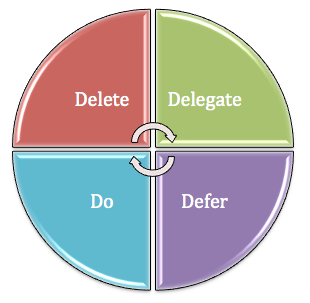How to Deal With Difficult People – Respond with the 4 D’s
(Photo by Guyon Morée)
Do you ever deal with difficult people? Of course! We all do. It’s just the way life works.
However, complaining about the difficult person or wishing they weren’t there is silly because difficult people will always show up.
Rather than wasting time complaining, we need to focus on our response. The challenge we face from difficult people if not in how they act, but rather in how we respond to them. Or more correctly, it’s in how we choose to respond. Too often, people don’t make a choice at all and just respond reflexively out of emotion. That almost always makes the situation worse.
When I started my speaking business I would periodically speak for free to promote myself and get my name out there. I spoke to one local group and it went really well. Two years later the president of the group, who had enjoyed my first presentation, invited me to come back and speak to them again. I agreed, because I liked them and I wanted to give back to a group that helped me when I was starting out.
This was also a “short notice” date, where the event was only three weeks away. Since she had seen me before, we didn’t have to go through a whole rigmarole of questions and analysis. They knew what I could do and I knew the group. We agreed on a date and were all set.
Before that call ended, she said, “I’m going to have you chat with our program chair so you can give her some information about your program.”
“Great,” I said, “no problem.”
I had the call with the program chair and what I thought was just going to be a simple conversation about logistics and promotion turned into an interrogation.
She started simply with, “Well, what are you going to do?’ That’s fine. Fair question. I answered her by giving an overview of the program.
She said, “Okay, well what is that going to look like?” I went a little deeper and gave her the rough outline: Here are the points I’m going to cover, here’s what I’m going to do.
Then she started drilling further and further: “What does that mean? What kind of exercise? What else are you going to do?”
It just kept going deeper and deeper, question after question. She was very probing and somewhat antagonistic about my program.
I started to get very defensive. It seemed crazy – for every other speaking gig I engaged in, even the full-fee ones, my calls featured much less interrogation. The client (or prospect) would ask me basic questions and I’d take them through the overview. They may ask a few follow up content questions, but they just wanted to get the gist. They trusted I was a professional, and that was all they needed.
I was also defensive for two more reasons:
- The president of the group and I had spoken and we had already confirmed the program. I was thrown by suddenly having to “re-sell” my program.
- This was a free program that they asked me to do. Why was I being interrogated like this?
This was years ago, so I was not as, shall we say, “enlightened,” about maintaining emotional control and letting things go. I responded by snapping a bit and arguing back. Then she got defensive.
We went back and forth for a bit until we ended the call with me no longer on the calendar.
A few days later the president called me up to ask me what had happened.
I filled her in on the conversation. She did not blame me and she hinted at other times this person had acted this way.
Suffice it to say, in my mind, that program chair was the difficult person. However, the issue wasn’t about her difficulty. The key is how I responded, and I responded poorly.
Whether you think she was right or I was right (or somewhere in between), I responded without thought and with emotion, and that is almost never effective.
There are really three steps in our interactions with other people:
- The stimulus – the thing that the person does or says that generates an emotional response.
- The gap – the moment – however short or long – before we respond.
- The response – what we do or say next.
Quite often, the emotion generated by the stimulus makes people skip the gap. What I’m suggesting you do is pause and use the space in that gap to figure out how to deal with that difficult person.
There is a simple method you can use to deal with difficult people that comes from the world of email time management. People who teach productivity with email tell you to use the “Four D’s of email management,” which says that when you are going through your email you should either:
- Delete the email if it is spam or needs no attention.
- Delegate the email by forwarding it to the person who should be responding – or who you can tell/ask to respond.
- Defer the email if you can not respond to it right away by scheduling a time to get back to it (i.e. don’t just skip it and say, “I’ll get back to this later”)
- Do what is ever required by the email – respond, make a call, take an action – right away to get it done and off your plate.
You can apply these four D’s to dealing with difficult people in the exact same way. Once the stimulus has created an emotional response, use that pause in the gap to calm down, focus, and see if you can respond with one of the four D’s:
- Delete – Remove yourself from the situation, or remove that person from your life or situation. It’s amazing how sometimes, when we’re dealing with a customer, or even a stranger, we get into an argument we don’t really need to be in. We don’t really need to be in that argument, but we just keep fighting. So delete, get yourself out of that situation.
- Delegate – If a difficult person is causing a problem for you, perhaps you hand it off to someone else. Not to “pass the buck,” but sometimes you need to escalate to a supervisor. Sometimes you have a colleague who’s more qualified to deal with it. Sometimes there are other people who are better at the things you don’t like to do.
- Defer – Deal with them later. You’ve got a lot on your plate and right now may not be the best time to handle it. Schedule a time to have a meeting or phone call to address the issue. Or schedule a time that you’re going to do the things you need to in your own life to deal with that difficult person.
- Do It – If it’s something that you can’t delete, delegate or defer, then deal with it now. Don’t delay. Just do it, bite the bullet. The longer you wait, the harder it’s going to be, and you’re going to be miserable until you handle it.
In the gap, think about which of the four D’s you can use, and then use it.
In my story, deleting is what ended up happened by default. Since I was a solo practitioner, I had no one to delegate it to. However, I definitely could have deferred by asking her what she was specifically looking for and then scheduled a future call where I could have gathered the info. Or I could have used that time to go back to my contact. I also could have used “Do It” by directly addressing the feeling I was having that she seemed uncomfortable with me presenting.
How about you? When you’re faced with a difficult person, do you just give into the emotion, or do you have a pause where you consider your response?
The next time you deal with a difficult person, keep this process in mind. When you feel that negative emotion coming up, pause, take a breath, gather your thoughts, and then, rather than getting sucked into that bad experience, see if you can use one of these four D’s to handle it.
***
Interested in an interactive workshop with your team to help them more quickly and effectively deal with difficult people? Click here to check out Avish’s Training Programs now!















 RSS
RSS Email
Email




